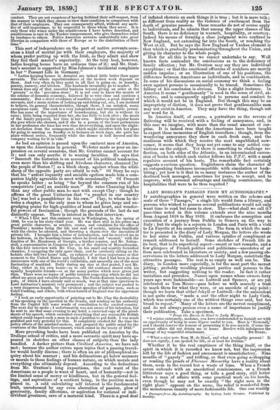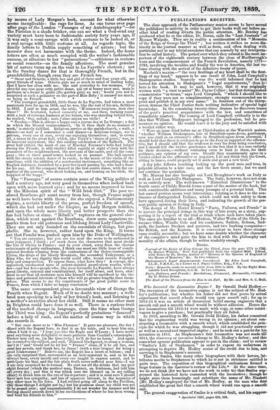LADY MORGAN'S PASSAGES FROM MY AUTOBIOGRAPHY.* IF autobiographies in general
were written on the scheme and scale of these "Passages," a single life would form a library, and persons who wished to possess several publications would, not only want time to read but room to stow. The—what shall we call it ? pass-time noted in this volume extends over the nine months from August 1818 to May 1819. It embraces the conception and execution of a journey from Dublin to Geneva on the way to Italy ; but its staple is a sojourn in London and Paris with a visit to La Fayette at his country-house. The form in which the mat- ter is presented is the diary of Lady Morgan, the letters she wrote to her sister in Dublin, and various epistles of compliment or remark addressed to herself. Some sketches of French life in its best, that is its superficial aspect—smart or tart remarks, and a few glimpses of French politics and politicians—anecdotes of or from men celebrated in literature or society, and a few passing ob- servations in the letters addressed to Lady Morgan, constitute the attractive passages. The rest is as empty as well can be. The diary, in London more especially, is for the most part the merest jotting; probably recalling pleasant parties and persons to the writer, but suggesting nothing to the reader. In fact it rather tantalizes and provokes. Names upon names whose owners forty years ago were fashionable—as Luttrell and Spencer, or are yet celebrated as Tom Moore—pass before us with scarcely a trait to mark them for what they were, or an anecdote of any point ; though we learn that either Jekyll or Luttrell—for the antecedent is not quite clear, "made a mot the other night to Lady Cork, which was certainly one of the wittiest things ever said, but too broad to repeat." Many of the letters are the merest compliment, and do not always possess even a name of importance to justify their publication. Take a specimen.
"From the Baron de Steel to Lady Morgan.
"I rejoice extremely, madame, you have condescended to furnish me with an opportunity of being in some degree useful to you. Here is • Sismondi,' and I should reserve the honour of presenting it to you myself, if some im- portant affairs did not detain me at home. Receive with indulgence the homage of my respectful attachment. Da biTAEL. •
"What a nice note from M. de Stael, and what a valuable present ! It does not signify, I am spoiled for life, or at least for Dublin."
'Whether it be the real emptiness of the thing itself, or the spirit in which it is recorded we know not, but the impression left by the life of fashion and amusement is unsatisfactory. Nine months of " gayety " and trifling, so that even going a-shopping or reading the proofs of Florence Macarthy have a reality about them, seem in the record but a waste of time. When a French saran unbends with an aneedotical reminiscence, or a French littkrateur says a good thing, or tells a good story, still better when a man of affairs with some practical work on his hands, even though he may not be exactly "the right man in the right place". appears on the scene, the relief is wonderful from the monotonous inanity of mere fashionable life. One can readily
• Passages from Mg Autobiography. By Sydney Lady Morgan. Published by Bentley.
by means of Lady Morgan's book, account for what otherwise seems inexplicable: the rage for lions. As one turns over page after page of the London "Passages of my Autobiography "—for the Parisian is a shade brisker, one can see what a God-send any variety must have been to fashionable society forty years ago, if it was only a semi-savage with a rich costume to be looked at, or a real savage with little costume at all. As regards topic, the family letters to Dublin supply something of nature; but the manner does not harmonize with the theme. Indeed, the home letters are often as much occupied with the writer's fashionable success, or allusions to her "persecutions "—criticisms in reviews or social remarks—as the family affections. The most genuine bit of nature turns up on the visit to La Fayette's chateau ; not in the Sunday dance for that is thoroughly French, but in the grandchildren though even they are French too.
"Oscar and grandchildren, a little boy and girl of three and four years old, are great friends of mine. Octwde puts me so much in mind of darling baby, that I have her often with me. She said yesterday to her mamma, cherchfi flue rose pour cette petite dame, qui eat si bonne pour moi, macs le jardinier 11;a ferule le grille (the garden gate) au nez ; ' would you not be surprised at such a gallantry on the part of Muss Baby ? it amused me much, as lbeing so French. *
"The youngest grandchild, little Oscar de La Fayette. had taken a most passionate love for me in 1816, and he was, like the rest of his sex, faithless in 1818. I said to him across the table, Waimes-tu toujours, mon cher Oscar ? ' He hesitated, looked earnestly at me, and then, turning round with a look of extreme fondness at his bonne, who was standing behind him, he replied, ' Oui miladi ; mais j'aime mieux ma vielle ! • •
"Sunday.—This is always a happy and a joyous day at La Grange ; a day in which the blessed commandment, 'In it thou shalt do no manner of work,' is strictly fulfilled. Religious service at the parish church, a walk, a dinner—as well as I remember a cold dinner—s delicious lounge, Bur la pelouse, every one at ease, every one enjoying themselves ; and, to crown all, a dance in the great hall, which, like Yorick's dance of grace,' was, in its innocent enjoyment, like this smiling celebration of the Sabbath. The great hall (where the mark of one of Marshal Turenne's balls had lodged during the Fronde, is still visible) filled rapidly at eight o'clock with the peasantry of the neighbourhood, the servants of the castle, and all the com- pany; two or three gensd'armes looked in en peasant. The ball opened with the steady solemn dance of Is ronde, to the music of the violin of the concierge, with the addition of a nondescript instrument, something like an English dulcimer, furnished by ft poor Savoyard passing by, who had a franc for his pay. All the company danced in the first centre dense' with the ex- ception of the general, who stood looking on, and leaning on his stick, the happiest of the happy."
The "Passages" of course contain some of the Whig politics of half a century ago, not very good in themselves when looked back upon with more learned eyes ; and by no means improved in tone by the Milesian spirit of the "Wild Irish Girl." The poor re- stored Bourbons get scant mercy from her, though France might as well have borne with them; for she enjoyed a Parliamentary . regime, a certain liberty of the press, perfect freedom of speech, which she had not under the Empire, as Lady Morgan testifies, and upon the whole more liberty and better prospects than she has had before or since. "Milades" raptures on the general elec- tion which went against the Bourbons, drew some sagacious re- marks from her old patroness and lifelong friend Lady Charleville. They are not only founded on the essentials of things, but pro- phetic. She is, however, rather hard upon the King. It turns out that Fondle was pushed upon him by the Duke of Wellington. "You are sanguine ; but you are too near the scene to be unbiassed in your judgment, I think ; yet mark down the characters that must decide the fate of liberty in France; and in your closet, away from the charme entrainante of party enthusiasm' I think one must see little hope of consti- tutional freedom winning from the contentions of the thrice-contemptible Ultras, the dregs of the bloody Mountain, the scoundrel Talleyrand, or a King who, for any dignity this world- could offer, would receive Fouche's help and compunction. To oppose these, what have they ? A corrupt, dis- organized, uneducated mass of ardent-minded guard-room youths, with a few—and but few—people who, like your favourite La Fayette, have always
loved liberty, rational and constitutional, for itself alone and have, alas! lived to see that all moderate men like himself will be sacrificed to the vio- lence and_personal interests of those who will go greater lengths than them- selves. This seems to me the constituents of the great public scone in France, from which I infer no happy conclusion."
The same correspondent gives a favourable view of George the Fourth when Regent. Much of it no doubt was manner ; a well- bred man speaking to a lady of her friend's book, and listening to a mother's anxieties about her child. Still it seems no other man in Brighton could have done it so well. There is a curious trait of the marked change in language, since the time when George the Third was king : the Regent's perfectly gratuitous "damned" before a lady of rank, and the matter of course way in which she records it.
"But once more as to Miss Florence.' It gave me pleasure, the day I dined with the Regent here, to find it on his table, and to hear him say, when I took it up, I hope you like the Eagle and O'Leary ; I have never read anything more delightful or more pathetic than Cumhal's catastrophe ; Croker may rail on, Lin the Quarterly,] he'll de her no harm.' And again he reverted to the subject, and said, 'Damned blackguard, to abuse a woman, isn't it ?' and Could not he let her " France " alone, if it be all lies, and read her novels, and thank her, by haus ! (with a true brogue) for being a good Irishwoman ? ' Believe me, the Regent has a heart at bottom ; and I am only surprised that, surrounded as an heir-apparent is, and as he has always been, every mouth and oyez?, eye taught to express assent, and to anticipate his bias and the fa plain truth never suffered near him—I say I am only surprise id he is human. He sent me all the drinks that my poor child fancied (which the medical man, Tierney, an Irishman, had told him of) every day ; and this it was which sent me (dressed up in my rolling chair) to thank him on the eve of his departure and it is most sure I should have met less sympathy, and less of apparent interest, in the inquiries of any other man in the town. I had refused going all along to the Pavilion, (for those things I delight not in,) but his goodness about my child was not to be passed over; and unquestionably I do not wonder his manner and his feeling should smooth down bi:ter recollections of where he has been wrong, and bind his friends to him."



























 Previous page
Previous page